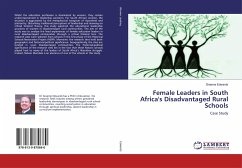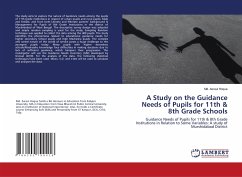
Female Leaders in South Africa's Disadvantaged Rural Schools
Case Study
Versandkostenfrei!
Versandfertig in 6-10 Tagen
58,99 €
inkl. MwSt.

PAYBACK Punkte
29 °P sammeln!
Whilst the education profession is dominated by women, they remain underrepresented in leadership positions. For South African women, the situation is aggravated by the metaphorical hangover of Apartheid and patriarchy. Disturbing traditional perceptions of leadership and drawing on critical feminist theory, this study explored the educational leadership practices of women in disadvantaged rural communities. The aim of the study was to analyse the lived experiences of female education leaders in rural disadvantaged communities through a critical feminist lens. The research sites were selected ...
Whilst the education profession is dominated by women, they remain underrepresented in leadership positions. For South African women, the situation is aggravated by the metaphorical hangover of Apartheid and patriarchy. Disturbing traditional perceptions of leadership and drawing on critical feminist theory, this study explored the educational leadership practices of women in disadvantaged rural communities. The aim of the study was to analyse the lived experiences of female education leaders in rural disadvantaged communities through a critical feminist lens. The research sites were selected from schools in the first phase of the Historical Schools Restoration Project (HSRP). Moreover, the research sites hold both geographic and historical-political significance. Geographically, the sites are located in rural, disadvantaged communities. The historical-political significance of the research sites lies in the fact that these historic schools played host to many of the leaders of South Africa's liberation struggle. Indeed, Nelson Mandela is an alumnus of one of the schools in this study.












